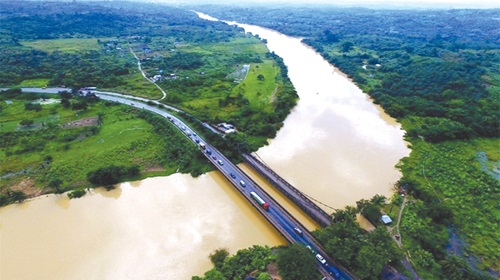The Environmental Protection Act 2025 (Act 1124) was passed on January 6, 2025. The Act seeks to underpin the country’s commitment to upholding its international obligations through the integration of international environmental law principles in the Act.
This, combined with other policy actions of the Government, such as the Ministry of Finance’s ‘Ghana Green Finance Taxonomy’, seeks to guide investments towards a sustainable and climate-resilient economy, aiming to make Ghana a pacesetter in the advancement of positive environmental policies in the West African sub-region.
Ghana faces significant environmental challenges. I want to highlight two in this article: galamsey and the illegal dumping of unwanted garments in Ghana’s internationally recognised wetlands.
Galamsey
Galamsey is an environmental scourge leading to severe land degradation, biodiversity loss, pollution of water bodies and acidification of soils, all of which are harmful to the biophysical and socio-economic environment.
Galamsey accounts for more than a third of Ghana’s annual gold output.
More than a million people are employed in the informal mining sector across 14 of Ghana’s 16 regions, costing the state an estimated annual $2bn (£1.58bn) in missed tax revenues.
Against a background of growing demand for gold and rising precious metal prices, gold washing and gold smuggling are increasing.
Growing demand for gold amplifies the risks of crime, corruption and instability in the mineral supply chain, according to the United Nations Office on Drugs and Crime.
A recent report by a non-profit organisation, Swissaid, found that Ghana was losing billions of dollars in revenue annually to smuggling from its ‘booming artisanal gold mining sector’.
Much of the gold ends up in the United Arab Emirates. Swissaid identified a massive 229 metric ton trade gap, equivalent to $11.4 billion, between Ghana’s gold exports and corresponding imports over just five years, with most of the gold smuggled through neighbouring countries such as Togo and Burkina Faso before reaching Dubai. Ghana earned $11.6 billion in gold export revenue in 2023 and has started efforts to centralise and regulate the gold trade.
Discarded clothes
A second environmental issue of growing concern in Ghana is the massive dumping of discarded clothes from the UK and Europe.
Some of the clothes end up in a huge illegal rubbish dump in internationally recognised and protected wetlands in the Densu delta, on the western outskirts of Accra.
It is a designated site of international importance under the intergovernmental Ramsar convention on wetlands.
Endangered leatherback and green turtles lay their eggs there, and the mudflats also support rare roseate terns, which migrate from the UK, as well as curlew sandpipers.
Reporters from a non-profit organisation, Unearthed, working with Greenpeace Africa, found two recently opened dump sites in the wetland’s protected area and a third dump upstream on the banks of the Densu.
New clothes dumping sites are also springing up beyond urban areas such as Accra and in conservation areas vital for wildlife.
The Unearthed investigation found textile waste, including UK labels, tangled in vegetation, half-buried in sand, and in waste washed up at a beach resort where a manager said he burned piles of clothes every week.
Properly engineered landfills include a lined bottom, a system for collecting and treating leachate, groundwater monitoring, gas extraction and a cap system. Drone footage of the Akkaway dump, the newest site, shows a large area of the wetlands where the vegetation had been removed.
Piles of waste sit on bare earth, close to lagoons and streams, with no lining or other visible pollution mitigation systems.
An official from the local government, the Weija Gbawe municipal assembly, told a reporter that it was in charge of the Akkaway dump and supervised the work there.
Siting a new dump site in protected wetlands, however, appears to violate Ghana’s environmental policy and landfill guidelines, and the country’s obligations under the Ramsar convention.
The assembly did not respond to a formal request for comment from the UK newspaper, The Guardian.
Pollution
Local people who depend on the wetlands for their livelihoods say they are worried about the impact of the pollution. According to Seth Tetteh, 31, who has lived near the delta for seven years.
‘It’s only since three years ago that they started dumping the borla [the waste] further upstream.
So when you start fishing and cast your net, it brings in fish, clothes and other things, so … the fishermen … find it very tedious … Before, you could drink [the river water].
But now, when you go, you can’t drink it.
The water is a bit black.’
Residents near the upstream dump, called Weija Ashbread, told reporters that before the site existed, the area was mostly wild.
There were ‘alligators, bush cats … all kinds of birds and rabbits too’, said Ibrahim Sadiq, 19, a student who lives nearby. Now when it rains ‘there are so many mosquitoes and the smell, it’s very bad’.
Galamsey and illegal dumping of discarded clothes are serious environmental issues.
Ghanaians would be united in saying that they want to leave their country in an improved environmental state for their children and grandchildren.
While the Mahama government is showing interest in fixing issues in the gold sector and a new Environmental Protection Act is to be welcomed, overall environmental protection progress is slow. More, much more, must be done, and quickly.
The writer is an Emeritus Professor of Politics, London Metropolitan University, UK
Email: tsjhayn1@londonmet.ac.uk

